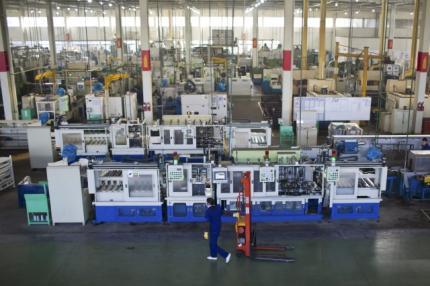Asian shares sag on Chinese growth anxiety, emerging currenc
Bareksa • 24 Jan 2014

An employee works at a production line at a Wanxiang electric vehicle factory in Hangzhou (REUTERS/Aly Song)
The yen was steady at 103.30 to the dollar, having risen 1.2 percent overnight
Reuters - Asian shares were off-colour on Friday, extending the previous day's weakness as disappointing Chinese manufacturing data raised concerns over the economy, and investors sought safety in gold and the yen.
MSCI's broadest index of Asia-Pacific shares outside Japan slipped 0.1 percent, having fallen 1.3 percent in the previous session to a 4-1/2 month low following the Chinese factory activity report.
A decline in the flash Markit/HSBC Purchasing Managers' Index for China, the world's second-largest economy, reinforced concerns about global growth, especially in commodity-sensitive emerging markets.
"As capital costs rise and investment slows, commodity prices should come under pressure, boding poorly for economies linked to China's old growth model," Morgan Stanley analysts wrote in a note.
Emerging currencies were battered overnight, with the Turkish lira hitting a record low against the dollar, the South African rand slumping to a 5-1/2 year low and the Russian rouble falling to its weakest in nearly five years.
On top of that the Federal Reserve is expected to continue to dial back its bond purchases when it meets next week after U.S. jobless claims data reflected an acceptable, if underwhelming, pace of job growth - heaping more pressure on emerging country currencies.
The dollar tumbled against the euro, Swiss franc and the yen, however. It fell 0.9 percent against a basket of major currencies, marking its worst one-day decline in three months and hitting a three-week trough.
The euro was quoted at $1.3696, near a more than one-week high after climbing 1.1 percent on Thursday, its biggest single-day gain since mid-September, on the back of mostly encouraging business surveys from the euro zone's private sector.
"We would be cautious of fading this risk aversion move given the scale of some of the losses in commodity and emerging forex, and the EUR may stay better supported in the near-term as EUR-funded risk positions are covered," analysts at BNP Paribas wrote in a note.
The yen was steady at 103.30 to the dollar, having risen 1.2 percent overnight, its biggest one-day gain since late August.
NIKKEI SET TO TUMBLE
As the yen strengthened against the dollar, Nikkei futures tumbled 2 percent, pointing to more losses for the Japanese benchmark after dropping 0.8 percent on Thursday.
U.S. stocks fell on Thursday, with the Standard & Poor's 500 off 0.9 percent and the Dow Jones industrial average down 1.1 percent to record its third consecutive day of losses. S&P 500 E-mini futures were a tad weaker in early Asian trade on Friday.
Investors cut their positions in risky assets, buoying the safe-haven assets of gold and highly-rated government bonds.
Yields on 10-year benchmark U.S. Treasuries hit a seven-week low of 2.7589 percent on Thursday, while those on German Bunds fell to 1.713 percent, also reaching a seven-week low.
Gold added 0.1 percent to $1,263.56 an ounce on Friday morning, close to a six-week high of $1,265.40 set in the previous day.
U.S. crude futures was little changed at $97.34 a barrel, not far from a three-week high of $97.84 hit on Thursday after data showed a larger-than-expected draw in distillate stocks caused by sustained cold.